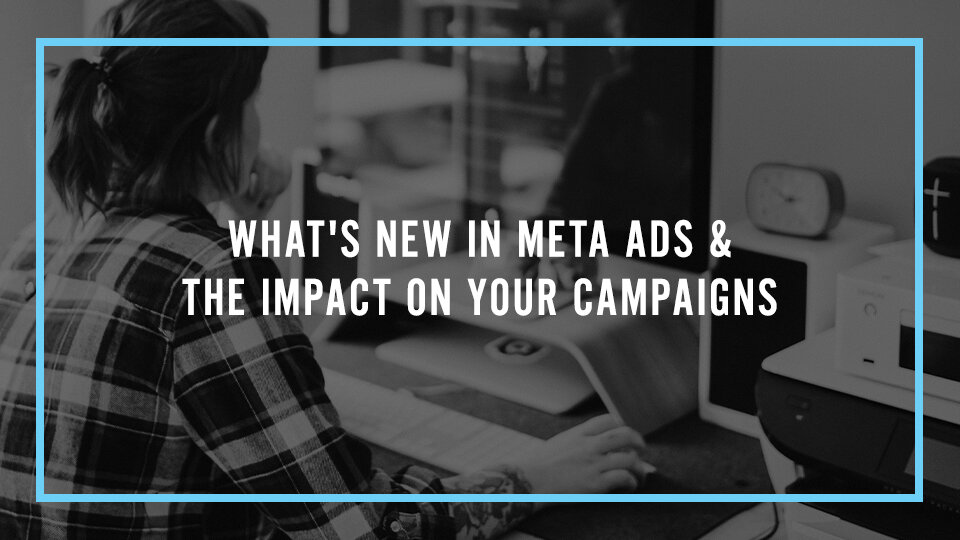What's New in Meta Ads & The Impact on Your Campaigns
By Maurilio Amorim
I have a love/hate relationship with Meta ads. When they work, they work exceptionally well. But sometimes, they stop working, and it’s back to square one.
Since the unfortunate IOS 14 update, Meta, former Facebook, has been trying to figure out how to bypass all the personal information restrictions Apple has put in place, making it virtually impossible for marketers to “follow” people online.
Finally, we see the light at the end of the tunnel with some great new tools now available in Ads Manager.
These changes affect targeting, performance tracking, and overall campaign management. Let’s explore how these new developments affect campaigns.
1. Enhanced Targeting Options
One of the most notable updates in Meta Ads Manager is the enhancement of targeting options. Meta has introduced more granular targeting capabilities, allowing advertisers to reach their audiences more precisely.
Interest Targeting Expansion: Meta has expanded its interest categories, enabling advertisers to target users based on more specific interests and behaviors. This enhancement helps in creating more tailored and relevant ad experiences for users.
Advanced Demographic Targeting: Advertisers can target users based on detailed demographic attributes, such as life events, purchase behaviors, and household composition. This allows for more personalized ad delivery and improved campaign effectiveness.
Impact: These enhanced targeting options enable advertisers to reach more precise audience segments, resulting in higher engagement rates and better conversion outcomes. By tailoring ads to specific interests and demographics, campaigns are more likely to resonate with the target audience.
2. Improved Ad Performance Tracking
Meta has also made significant improvements to its ad performance tracking tools. These enhancements give advertisers deeper insights into their campaigns, allowing for more informed decision-making.
Conversion API Enhancements: Meta’s Conversion API has been upgraded to offer more accurate and comprehensive data on user actions. This helps advertisers track conversions more effectively and optimize their campaigns based on real-time data.
Advanced Attribution Models: New attribution models have been introduced to help advertisers better understand the customer journey. These models help identify which touchpoints are most effective in driving conversions.
Impact: Improved ad performance tracking allows advertisers to understand their campaign effectiveness better. With more accurate data, advertisers can optimize their strategies, allocate budgets more efficiently, and achieve better ROI.
3. Enhanced Creative Tools
Creative tools in Meta Ads Manager have seen significant upgrades, offering advertisers more flexibility and creativity in designing their ads.
Dynamic Creative Optimization: This feature automatically tests different combinations of ad elements (such as images, headlines, and calls-to-action) to determine the most effective variations. It helps in delivering the best-performing ad combinations to the target audience.
Interactive Ad Formats: Meta has introduced new interactive ad formats, such as augmented reality (AR) ads and instant experience ads. These formats engage users in unique ways and provide immersive ad experiences.
Impact: Enhanced creative tools enable advertisers to create more engaging and visually appealing ads. By leveraging dynamic creative optimization and interactive formats, campaigns can capture user attention more effectively and drive higher engagement rates.
4. Privacy and Data Management Updates
With increasing concerns around data privacy, Meta has implemented several updates to ensure compliance with new regulations and enhance user privacy.
Aggregated Event Measurement: This update helps advertisers measure campaign performance in a way that respects user privacy. It allows for continued campaign optimization while adhering to data privacy standards.
Data Deletion Controls: Advertisers now have more control over data deletion requests, ensuring user data is handled responsibly and complies with privacy regulations.
Impact: While these privacy updates may present challenges regarding data availability, they also foster trust and transparency with users. Advertisers who adapt to these changes and prioritize user privacy can build stronger relationships with their audience.
The recent developments in Meta Ads Manager have introduced powerful new tools and features that significantly impact campaign management. From enhanced targeting options and improved performance tracking to advanced creative tools and privacy updates, these changes offer both opportunities and challenges for advertisers.
Advertisers can leverage Meta’s Ads Manager to create more effective and engaging campaigns by staying informed about these updates and adapting their strategies accordingly. As the digital advertising evolves, embracing these developments will be key to achieving sustained success in your advertising efforts.
Ready to optimize your Meta ad campaigns with the latest tools and strategies? Feel free to contact me for a free consultation to learn how my team and I can help you leverage these new developments to enhance your advertising performance and achieve your marketing goals.














